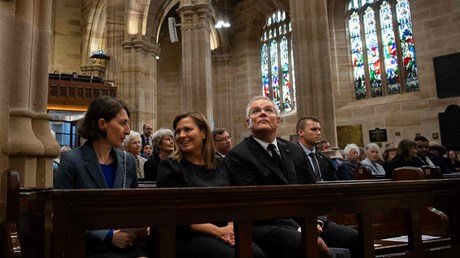As Scott Morrison steps down, evangelicals assess the way he brought religion into politics.

Scott Morrison went to church. And he invited the journalists along too.
One month before Australia’s federal election in 2019, the prime minister traveled to Horizon Church, a Pentecostal congregation in New South Wales. He closed his eyes, raised his hands, and let the cameras click away.
The images drew a sharp reaction from a public uncomfortable with charismatic worship—and from Christians who saw it as a publicity stunt.
But then Morrison won. His Liberal-National Coalition (LNC)—a center-right party—overcame the predictions of pollsters and secured 77 seats.
“I have always believed in miracles,” he said. “And tonight we've been delivered another one.”
Three years later, Morrison returned to the same church. Again the journalists followed. But this time the election didn’t go his way. The LNC lost to the Labor Party on May 21, and the next day Morrison stood up at Horizon Church and read a few passages from the Bible.
“At the last election, we really understood it was for such a time as this,” he said in an emotional three-minute talk. “And now we understand it was for such a time as that.”
As Morrison leaves office, evangelicals are assessing the way his faith interacted with his politics: how that was covered by the media, how it was viewed by the public, and how they would want Christians to act, as Christians, in the public sphere.
“Morrison’s faith has become a story because he is prominently and publicly Christian, as opposed to many past Christian prime ministers whose faith has been a more private affair,” said Chris Mulherin, an Anglican priest and the executive director of ISCAST (formally, the Institute for the Study ...
from Christianity Today Magazine
Umn ministry


.gif)

.gif)
.gif)
